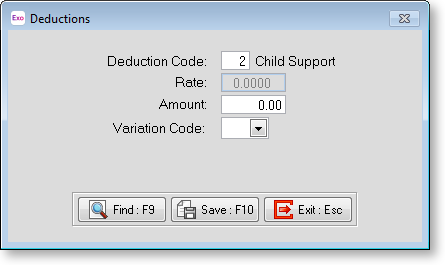Deductions
Deduction transactions require the Deduction Code, and depending on the deduction setup, may require the Rate, Amount, or possible Child Support exception codes (for Child Support deductions).
To pay deductions, enter "0" (zero) or "E". This will bring up the pay deductions screen where you can enter the details of the deduction.
Deductions are paid based on the settings from Head office. The pay deductions screen allows you to enter the deductions details based on the code that has been chosen. Please note that not all the options shown below will be available, as this will depend on the deduction.
Deductions require a deduction code and the amount be deducted.

Deduction Code This is the unique code assigned to the deduction. Enter the code of the deduction you wish to pay. You can press Find: F9 for a list of available deductions.
Rate Only available on percentage of gross pay deduction types - this is the percentage rate used for calculation.
Amount This is the dollar amount for the deduction to subtract from the employee's pay (Note that if the employee does not have enough pay to cover this deduction, then the pay clerk will be warned of this fact when they import the pay and will have to manually correct this person's pay).
Variation Code The list of Variation Codes appears when transacting Child Support deductions, and only needs to be entered when the amount being deducted is different from the amount deducted in the prior pay period. Possible codes are:
-
C = Ceased Employment - If an employee stops working for you, deduct child support from the last full pay you gave them and from any holiday pay due. Enter code "C" so that the IRD can remove the employee from your records. Do not use this variation code if the employee stops then restarts working for within the same month
-
A = Advanced Payment - If an employee is paid in advance (say if they are on holiday during the next payday) deduct child support from the advance as though you are paying the employee on the usual payday. Then add this to the other child support deductions for the period when the employee was given the advance pay. The child support deducted will be more than usual for that period, so enter "A" as the variation code.
-
P = Protected Earnings - If the employee's earnings are lower than usual, you may not be able to deduct the full child support requested due to the net protected earnings rule. In this case, enter "P" as the variation code
-
S = Short Term Absence - If the employee is off work on unpaid leave for a short period of time and you cannot deduct any or all of the amount requested, enter "S" as the variation code
-
D = Deducted previously - If the full amount of child support hasn't been deducted from an employee's wages because you previously made an advance payment, the child support will be less for that period, so enter "D" as the variation code.
-
O = Other - Enter "O" if none of the other variation codes explain why the amount of child support deducted is different from what was expected.
